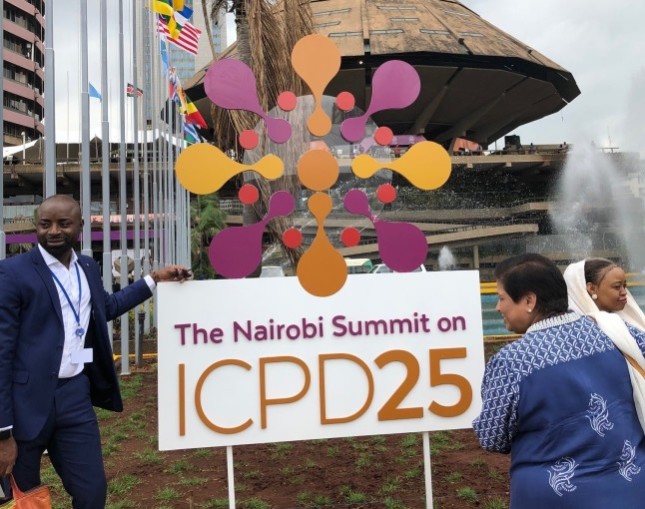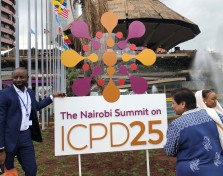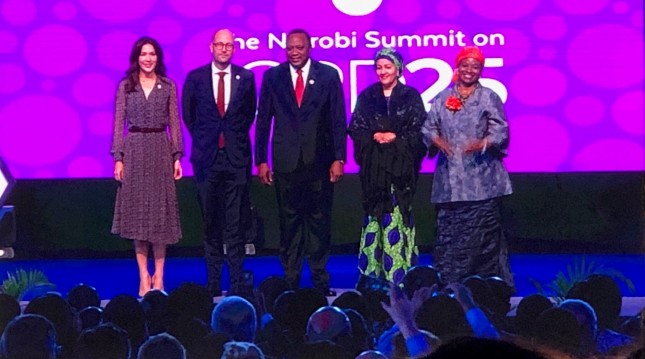-
ICPD25: I March for Gender Equality
November 26, 2019 By Sarah B. Barnes The Nairobi Summit on ICPD25 came a quarter century after the landmark International Conference on Population and Development (ICPD) was held in Cairo in 1994. Pledges made 25 years ago by 179 countries recognized that human rights, including reproductive rights, were fundamental to development and population concerns. A rigorous Programme of Action was created to reduce maternal deaths, ensure access to family planning, and protect women and girls from gender-based violence, including female genital mutilation and child marriage.
The Nairobi Summit on ICPD25 came a quarter century after the landmark International Conference on Population and Development (ICPD) was held in Cairo in 1994. Pledges made 25 years ago by 179 countries recognized that human rights, including reproductive rights, were fundamental to development and population concerns. A rigorous Programme of Action was created to reduce maternal deaths, ensure access to family planning, and protect women and girls from gender-based violence, including female genital mutilation and child marriage.
The Nairobi Summit on ICPD25 came a quarter century after the landmark International Conference on Population and Development (ICPD) was held in Cairo in 1994. Pledges made 25 years ago by 179 countries recognized that human rights, including reproductive rights, were fundamental to development and population concerns. A rigorous Programme of Action was created to reduce maternal deaths, ensure access to family planning, and protect women and girls from gender-based violence, including female genital mutilation and child marriage.
Hosted by UNFPA and the governments of Kenya and Denmark, the two-and-a-half-day 2019 Nairobi Summit recognized the achievements of the last 25 years. And it was designed to accelerate the progress toward realizing these ambitious goals. “Twenty-five years ago, we knew that protecting the rights of women and girls was a promise worth keeping… Now is the time to fulfill the rights, choices, and dignity for all,” said Crown Princess Mary of Denmark at the opening ceremony.
The Summit hosted some 9,500 delegates from more than 170 different countries. Attendees included heads of state, ministries of health, government officials, philanthropists, youth, the private sector, academics, as well as religious leaders and civil society. More than 1,200 concrete commitments were made to help ensure sexual and reproductive rights for all by 2030. Donor countries pledged more than $1 billion and the private sector promised another $8 billion. President Uhuru Kenyatta opened the conference with his commitment to end female genital mutilation in Kenya by 2022, which is eight years earlier than the country’s previous target.
“Women are the backbone of the family and the bedrock of the nation”“Women are the backbone of the family and the bedrock of the nation,” said President Kenyatta. “And because they are the gatekeepers to family health and they exert such a powerful influence on intergenerational outcomes for their children, empowering women essentially empowers the family, the society, and the nation.”
The Summit included more than 150 panels and activities which covered a wide range of topics including girls’ education, family planning, the intersectionality between sexual and reproductive health and rights (SRHR) and the environment, gender-based violence in humanitarian settings, the importance of midwives and nurses, feminist approaches to development, inclusion, and access to safe abortion. Throughout, the most striking threads were the absolute need for gender equity if we are to achieve the Sustainable Development Goals (SDGs) and the current power and voice of youth.
Gender Equity, Humanitarian Crises, and Gender-based Violence
Sexual and reproductive health and rights matter, because women and girls matter.
Gender is often at the core of the struggles and resistance around SRHR. Existing inequities for women and girls permeated every conversation related to population and development during the Nairobi Summit. A feminist approach to development and humanitarian aid is necessary to achieve ICPD objectives and 2030 agendas. A UNFPA report showed that last year, 136 million people needed humanitarian aid, 34 million were women and girls of reproductive age, and 5 million were pregnant. “Even people in humanitarian settings keep having sex, keep menstruating, keep getting pregnant. A feminist humanitarian system would make the health and rights of girls and women a priority, never an afterthought,” said Katja Iverson, President and CEO of Women Deliver.
Iverson discussed the significance of power and the core inequities women and girls face. “When a woman reports feeling unsafe collecting water or going to the toilet in the camp, that is an issue of power. When they don’t have the supplies they need for menstruation, that’s an issue of power,” she said. “When they are not consulted with what needs to happen, that’s a failure in the system and an abuse of power.”
Due to domestic violence and femicide by partners and family members, the deadliest place for women is in their homes, research shows. Globally, 1 in 3 women and girls are physically and/or sexually abused in their lifetime. Existing inequalities increase during humanitarian crises and when families are displaced; their homes further shattered. Women and girls are often subjected to increased rates of gender-based violence and discrimination. “Sexual exploitation and abuse has to be at the top of any agenda,” said Anne-Birgitte Albrectsen, CEO of Plan International as she talked about the lack of feminism in human assistance and the need for increased attention to girls’ rights and needs.
Access to family planning and sexual and reproductive health services are essential in humanitarian crises. Emergencies, such as armed conflict, natural disasters, and political unrest, significantly increase the barriers women and girls face to accessing these services. “Rights-based family planning must be at the center of development work,” said Geeta Rao Gupta, Executive Director of the 3D Program for Girls and Women. “The reproductive rights of women and girls are not up for negotiation. And we shall protect and uphold them,” said Dr. Natalia Kanem, Executive Director of UNFPA.
Youth Engagement
“Young people need a seat at the decision-making table, because no one will hold politicians accountable like a young person with a future to look forward to”To show that she was bringing young women and girls into the conversation, Albrectsen gave up her seat on the panel to a young refugee from South Sudan named Christine,* who took the stage and immediately said, “Women are used as a weapon of war.” She told of young girls with no sanitary pads sitting under a tree all day, using dirt to absorb their blood, and how this made them vulnerable within the community to pregnancy and early marriage. She wants to see comprehensive sexuality education in South Sudan, so young people can make choices, she said. “Regardless of the challenges I face, I will not give up.”
“Young people need a seat at the decision-making table, because no one will hold politicians accountable like a young person with a future to look forward to,” said Yolanda Joab-Mori, President of Chuuk Youth Council at a panel on sustainable development in fragile settings. The Nairobi Summit was committed to engaging youth and putting young people squarely at the table. Putting young people on not just the panels that discussed the lives of adolescents and young adults, but on all panels validated the important role youth are playing across the world as advocates of change. Young midwives, advocates, researchers, practitioners, members of the private sector, and academics fueled the conversations and commitments through their stories, passion, and expertise of topic and commanded their place in the Summit. Not being left behind is not enough, said Martin Karadzhov, Chair of The International Lesbian, Gay, Bisexual, Trans, and Intersex Association (ILGA) Youth Steering Committee at a panel on inclusion and the rights of LGBTQI youth, “We are not the future. We are here, have always been, and we are ready to lead the way.”
UNFPA asked young people why they march for reproductive rights, women’s empowerment, and gender equality and shared a video during the opening ceremonies.
“We are marching for gender equality the world over,” said Dr. Kanem. “Together, we will make the next 10 years a decade of action and results from women and girls, keeping their rights and choices at the center of everything we do.”
*First names used for speakers who may be under 18 years of age.
Sources: ICPD25, UNFPA, UN Women, Washington Post.
Photo Credits: Sarah Barnes, Wilson Center. All rights reserved.
 A Publication of the Stimson Center.
A Publication of the Stimson Center.

 The Nairobi Summit on
The Nairobi Summit on  Opening ceremony of ICPD25, November 12. From the left: Danish Crown Princess Mary; Danish Minister for Development Corporation, Rasmus Prehn; Kenyan President Uhuru Kenyatta; UN Deputy Secretary-General Amina Mohammed; and Executive Director of UNFPA, Dr. Natalia Kenam.
Opening ceremony of ICPD25, November 12. From the left: Danish Crown Princess Mary; Danish Minister for Development Corporation, Rasmus Prehn; Kenyan President Uhuru Kenyatta; UN Deputy Secretary-General Amina Mohammed; and Executive Director of UNFPA, Dr. Natalia Kenam.

